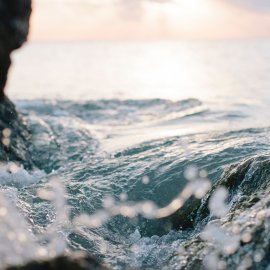A New Strategy for Nature, Part One
-
English
-
ListenPause
Welcome to World Ocean Radio...
I'm Peter Neill, director of the World Ocean Observatory.
The natural environment in the United States is under attack as never before. In the first months of his presidency, Donald Trump through appointments, executive orders, legislative initiatives, and budget allocations has launched an all-out attack on standing policies, regulations, and existing designations for environmental protection and natural resource conservation that have been established and evolved since the beginning of the 20th century. This sudden and relentless onslaught may set back the progress of the environmental movement for decades through political shock, indifference to science, and the dilution of laws and constitutional protections on which such things as the creation of the Department of Environmental Protection, the Clean Air Act, the Clean Water Act, and the Endangered Species Act, were originally based and have been defended.
The many environmental groups, communities and citizens that have taken steps to control this devastation, are rendered almost speechless by the sudden shift by government away from historical protections. They are angered and determined to triple-down on their efforts to oppose these changes; to fight them through political action and the courts; and to organize at the local, state, and national levels to prevent this senseless behavior.
Listening to meetings and attending protests I find myself awed by the commitment but disturbed by their adherence to the tactics and language on which their past achievements have been based. Successes, unfortunately, that have not been strong enough to counter opposition through effective education, persuasion, and political representation. What is most upsetting is that, as a result, in state legislatures and the U.S. Congress, they may not have the votes necessary to counter the new enhanced, anti-environment crusade.
What has gone wrong? Why has the true value of clean air and water, of sustainable exploitation of natural resources, of alternative forms of energy, of the protection from persistent poisons, not been fully understood and embraced by the larger public that will certainly suffer the consequence? What have environmentalists failed to do to promote their accomplishments and enlist legions to their cause? Why is the protection of land and sea – all that Nature provides for our wellbeing – not celebrated as the fundamental principle on which to build our future?
Since the 1970’s, we have adopted the strategy of many organizations aligned with many issues, a kind of practical, but narrow approach to confronting specific problems with specific solutions. When you look at what has been accomplished, you see a broad spectrum of such endeavors, fighting for individual victories through research, expert testimony, targeted lawsuits, and ardent local or issue-focused campaigns.
Personally, I feel that the electorate has misunderstood environmental protection in a similarly fragmented way – mostly connected to a local stimulus – a poisoned river, an occupational sickness, a threatened animal, or the destruction of a cherished place – that has enlisted them to oppose. Their reaction is driven by immediate, personal feeling, not by a larger understanding of the relation of their problem to the integrated natural system of which the local impact is just a part, not by the realization that their challenge can only be met ultimately by confrontation on a larger scale, by fixing the basic cause as the best way to deny the offending effect.
To do that requires a fully understood and shared value proposition and vocabulary by which to articulate the issues in a broader context of community and social benefit. It necessitates a unifying idea that links these individual concerns and their solutions to the protection and support of family and community to equity and social justice based on a fundamental understanding on how Nature and her resources, sustained, will sustain us too, and thus must be protected and preserved for the benefit of all humankind. If the environment does not survive, neither will we, nor our children.
We will discuss these issues and more in future editions of World Ocean Radio.
- - -
WORLD OCEAN RADIO IS A PROJECT OF THE WORLD OCEAN OBSERVATORY, IN ASSOCIATION WITH WERU-FM, BLUE HILL, MAINE. WORLD OCEAN RADIO IS DISTRIBUTED BY THE PUBLIC RADIO EXCHANGE AND THE PACIFICA NETWORK. FIND OUR PODCAST ON ITUNES AND AT WORLD OCEAN OBSERVATORY DOT ORG.
Since the U.S. election in November, the Trump Administration has taken bold action to change the policies, regulations, and environmental protections that have been in place since the beginning of the 20th century. In this episode of World Ocean Radio, host Peter Neill talks of the steps being taken by environmental groups and organizations to maintain historical protections. And he argues for the necessity of a more broad spectrum view to confront specific problems, recognizing the need for an understanding of integrated natural systems and global solutions required to manage local impacts.
About World Ocean Radio
Peter Neill, Director of the World Ocean Observatory and host of World Ocean Radio, provides coverage of a broad spectrum of ocean issues from science and education to advocacy and exemplary projects. World Ocean Radio, a project of the World Ocean Observatory, is a weekly series of five-minute audio essays available for syndicated use at no cost by college and community radio stations worldwide. A selection of episodes is now available in Portuguese, Spanish, French, Swahili, and Mandarin, enabling us to reach 75% of the world's population. For more information, visit WorldOceanObservatory.org/world-ocean-radio-global.
Image
Karl Fredrickson
- Login to post comments



